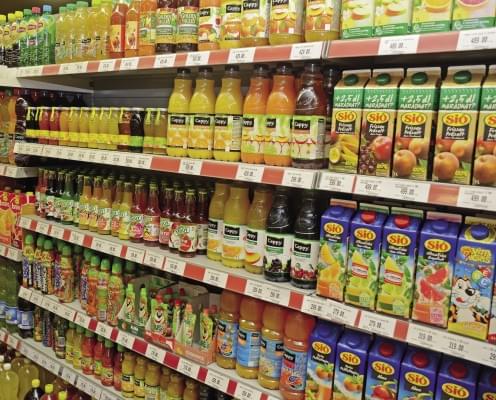Magazine: Sailing on the endless sea of flavours
In comparison with last year’s exceptionally positive trends, this year the Hungarian fruit juice market came to a bit of a halt. According to Nielsen, in the first half of 2016 like-for-like sales only expanded by 1.2 percent in volume and value sales improved by 6 percent. According to Balázs Bogár, trade marketing manager of Sió-Eckes Kft. one of the reasons why the trend broke was that in the first half of 2016 volume sales stagnated in the 100-percent juice category and value sales only augmented by 2.4 percent. Kata Bányi, trade marketing director of Coca-Cola HBC Magyarország Kft. informed that the price of fruit juice ingredients had increased in the world market, therefore the majority of manufacturers raised product prices this year. Rivan-Nova Kft. – the distributor of Dr. Steinberger fruit drinks – opines that nowadays it is trendy to lead a healthy lifestyle in Hungary and this has a positive influence on fruit juice sales.
Packaging-wise it is still carton and PET solutions that dominate: 98 percent of fruit juice is sold in these formats. Sales of Maspex Olympos Kft.’s Topjoy products doubled in both value and volume last year – revealed brand manager Anna Cholnoky. Judit Farkas, sales and marketing director of Fidel Kft. – the manufacturer of Biofidel – told Trade magazin that their 100-percent organic apple and apple-sour cherry juices are children’s favourites. Men prefer the apple-red currant juice, while women love the apple-elder and apple-blackcurrant juices. The Pfanner brand is traditionally strong in the 2-litre segment. Balázs Csorba, sales director of In-Food 2000 Kft. revealed that consumers still like to buy large-size premium products. Péter Hajdú, managing director of Rivan-Nova Kft. spoke to us about how more and more people get to like buying more types of products in one box: the company’s 5-Day Fitness Programme has been their most popular product for years.
Sió’s experience is that half of fruit juices sales is realised by hypermarkets and discount stores. After a long period of sales growth, the market share of private label fruit juices decreased in both value and volume in first half of 2016. Ms Bányi doesn’t agree: in her view sales of private label products were still growing, in part because the discount supermarket channel is developing dynamically. Coca-Cola launched many new products this year. Survey conducted by the beverage company revealed that consumers prefer drinking medium fruit content fruit juices for meals and when having snacks, therefore in May 2016 they came out with Cappy products with 20-51 percent fruit content. These products are available in 5 flavours: orange, apricot, apple, sour cherry and blackcurrant. In the Horeca channel 0.2-litre Cappy bottles were replaced with 0.25-litre products; these are available in 11 flavours.
SIÓ is proud of the fact that their Freshly Pressed sub-brand has become the category’s flagship: in the first half of 2016 like-for-like volume sales soared by 25 percent and value sales rose by 24 percent. SIÓ works with almost 1,000 fruit growers, buying all the fruit they process in Siófok from them. In the spring they even introduced some of these fruit farmers as part of the Farmers Who Care campaign. Rauch Hungária is present in the fruit juice market with the Happy Day, Bravo, Yippy and – from this year – the Rauch Fresh brands. The latter created a new category in the market of premium fruit juices. Rauch Fresh fruit juices aren’t made from concentrate, these 100-percent fruit juices are freshly pressed and need constant cooling. The product is available in 3 flavours at the moment: orange, apple-grape-raspberry, orange-mango-carrot. They are marketed in transparent, stylish 0.8-litre PET bottles.
Maspex Olympos Kft. has three product lines in the fruit juice market: Topjoy, Olympos and Kubu. In 2015 Topjoy’s biggest hit was the cactus flavour and the positive trend continued in 2016. This year’s new products are black dragon fruit and strawberry-pineapple, marketed in small bottle packaging. Olympos is the No.2 brand in the PET-bottle fruit juice market. In 2016 the new product line is Olympos Mediterranean, sold in 4 special flavours: apple-grape-black grape, apple-kiwi-lime, grapefruit-orange-lemon, apple-mango-starfruit. Kubu children’s drinks are the market leader in their category. This autumn a new Kubu product is launched, a special edition of Kubu Play in 1-litre carton packaging. It has a 25-percent fruit content and is available in apple-peach and apple-strawberry versions.
In-food 2000 Kft. distributes the Pfanner brand, sales of which increased significantly in the last few months. The driving force behind this sales growth was fruit juices with a high fruit content. Pfanner never ceases putting new innovations on the market. For Fidel Kft. 2016 was the first year in the market with their own fruit juices. The company manufactures 100-percent freshly pressed organic fruit juices and organic dried fruits. Next year Fidel Kft. plans to enter the market with smaller-size products too. New flavours will appear on store shelves in the form of limited edition products. Their products contain no added sugar, no additives, no added water and aren’t made from concentrate. Fruits for their apple-red currant, apple-elder and apple-blackcurrant juices come from their own organic farm. Sales of Rivan-Nova Kft., the distributor of Dr. Steinberger fruit drinks, increased by a hefty 15-16 percent in both 2015 and 2016. Their marketing message is simple, all they have to say is: eat healthier and pay attention to illness prevention.
Related news
Related news
Recognition of Consumer Protection Excellence: Honoring the Best of 2024
This year’s outstanding consumer protection officers and special award recipients…
Read more >KSH: industrial production decreased by 0.2 percent in October
In October, the volume of industrial production fell by 0.2…
Read more >Technological advancements and business travel
The latest research from International Workplace Group (IWG), the leading…
Read more >






